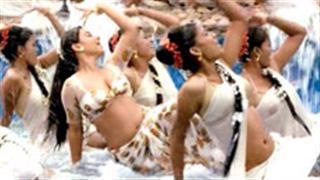The commercial success of "The Dirty Picture" gave new life to biopics. Bollywood has now lined up a slew of real people's real
stories, though filmmakers admit these are churned out with a dash of entertaining fiction.
"Paan Singh Tomar" closely followed "The Dirty Picture" and turned out to be a sleeper hit. Some upcoming biopics include
"Bhaag Milkha Bhaag", "Rang Rasiya", "Shoot Out At Wadala", "Once Upon A Time In Mumbaai 2" and "Barfi".
But filmmaker Mahesh Bhatt told: "Any biopic cannot be a pure biopic because one tends to add the entertainment quotient to the
film to make space for commercial zone.
It is easier to say that you are making a biopic than to actually make a biopic.
"Many of them claim it to be a biopic and use it for the publicity. There is a lot of pain that goes into the research of the character
and to do justice to the details of a person's journey. Just by claiming so, it doesn't become a biopic. You use a particular person,
icon as a peg to launch your product," he said.
Usually Hollywood starts a trend and Bollywood follows. Hindi films, however, resisted biopics for a long time. But the success of
"The Dirty Picture", about the life of southern sex icon Silk Smitha, seemed to alter the mindset.
Milan Luthria, director of "The Dirty Picture", starring Vidya Balan, feels there are no pure biopics.
"When my film did well, it gave more courage to others that biopics have the capacity to hit the commercial zone. So many real
life stories are there, but they are not pure biopics as entertainment is added to facts. When you go for a pure biopic, then it might
get a little boring," Luthria told.
Making biopics is challenging as the stories are separated from history to fit into specific requirements of showbiz.
However, director Ketan Mehta feels many times fact is more astonishing than fiction. "In many cases fact is stranger than the
fiction. Real life is more astonishing than a fictional story. Some of the biopics or their story is very fascinating," he told.
Mehta has wielded the megaphone for biopics like "Sardar", on the country's first home minister Sardar Vallabhbhai Patel; "Mangal
Pandey: The Rising", which told the story of one of the key leaders of 1857 Sepoy Mutiny; and his much delayed "Rang Rasiya",
based on the life of 19th century painter Raja Ravi Varma.
Translating the real life story on celluloid requires a lot of research.
"I take up subjects that inspire me. A lot more research goes into making a period film where you don't have enough records or
much evidence," Mehta told.
"Unfortunately, India has not started the trend of biopics yet. If it happens in the near future, then it is wonderful," he added.
Luthria feels "in Hollywood, this is an old trend and they have been working on it for a long time".
Sometimes filmmakers are dragged into legal trouble too.
"It depends on what the family feels about it? What are the terms and conditions agreed upon between them? There are a lot of
such things to be cleared," Ram Gopal Varma told. He had made "Rakta Charitra", a bilingual film on slain Andhra Pradesh
politician Paritala Ravindra.
"Many a time a director initially claims it to be a biopic and later says it has been inspired by a particular person. It happens
because the formalities are not completed. You get excited when the maker or the director says it is based on someone. But
when suddenly problems crop up, they might change the story," Verma added.
Bhatt said, "When you are exploring the human side to tell an untold story, one might get into trouble. At times the person's family
members may not be happy with the way you are portraying a character."
He described his production venture "Woh Lamhe" as a final goodbye to the memories of actress Parveen Babi, whom he loved
and lost.
The biopic virus is spreading so fast that after Vidya Balan and Irrfan Khan, even Bollywood superstar Shah Rukh Khan is likely to
play hockey legend Dhyan Chand.
Filmmakers line up biopics - with Bollywood twist
Tuesday, May 01, 2012 11:14 IST












